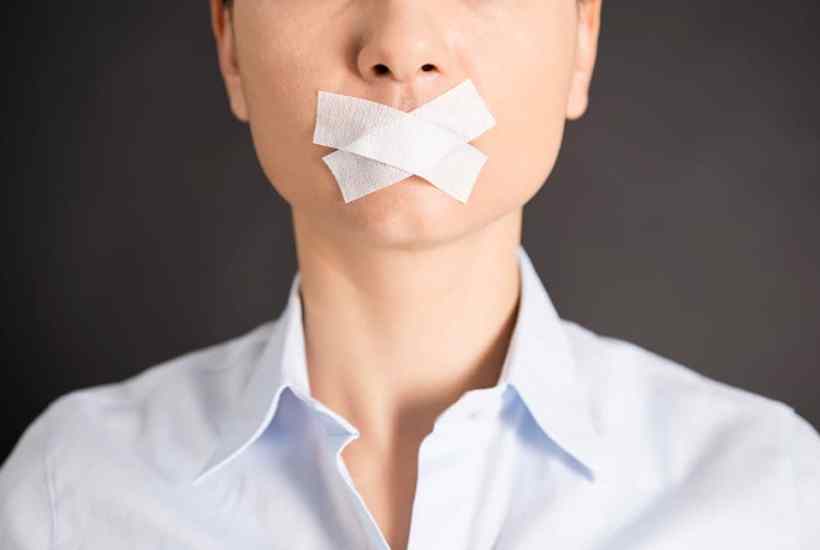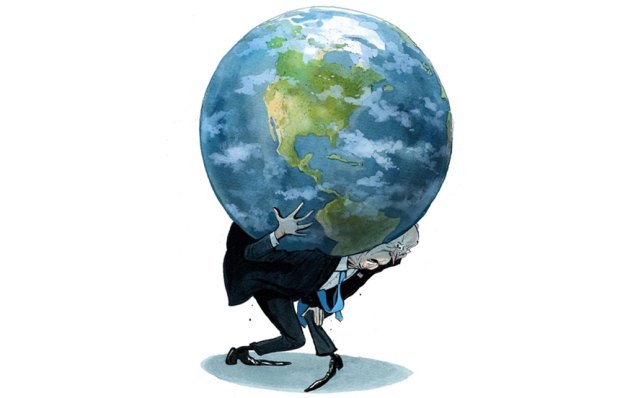I was extra pleased to have swerved the modern curse that is Wordle when I read that ‘sensitive’ words have been removed from it. A spokesman proclaimed: ‘In an effort to make the puzzle more accessible, we are reviewing the solutions and removing obscure or potentially insensitive words over time. HARRY is an example of an obscure word.’ Other more obviously ‘insensitive’ words had already been removed, such as ‘sluts,’ ‘bitch’ and ‘whore’, and though I’m the most rad of femmes, I do wish they’d stayed. Removing ribaldry makes the language increasingly bland.
‘Sensitivity’ is one of those words that’s changed its meaning. It was once used mostly to refer to sore teeth and gums. But just as ‘community’ now means people complaining and ‘activist’ now means sitting at home swearing on the internet, to be sensitive simply signifies you’re politically progressive.
In 2015, in this magazine, I invented the term cry-bully to describe a new type: ‘A hideous hybrid of victim and victor, weeper and walloper.’ Cry-bullies are everywhere, the duplicitous Pushmi-Pullyus of the personal and the political. And for a cry-bully, almost everything’s too insensitive. They’re ‘empaths’, they say, deeply disturbed by anything unpleasant.
If it was just Gen Z being soppy, you could slightly excuse it. But when middle-aged men and women who you respected for their apparent insouciance claim to be ‘empaths’, it’s hard not to despair. Witness John Lydon saying that punk was about ‘empathy’. Really? From where I was standing – right at the front of the crowd at the Screen on the Green – it was about anger and spite. But no doubt I got the wrong end of the stick. The Sex Pistols took issue with everyone, from girls who had abortions (‘Bodies’) to the Queen (not a human being, apparently). If this is empathy, then surely it’s only a matter of time before the surviving members of the Clash pop up and tell us that the line from their song ‘Hate and War’ – ‘I hate Englishmen, they’re just as bad as wops!’ – was a profoundly empathetic cry for international brotherhood.
I know that narcissists are public enemy number one these days, but if I had to live in a world solely composed of narcissists or empaths, I’d choose the former for the simple reason that it would be more fun. Under the influence of the sensitivity police, Coronation Street, once a haven of wisecracking broads and brawling sex-bombs, has become one long therapy session wherein the formerly feisty female characters inhabit ceaseless hamster wheels of being ‘in bits’, ‘destroyed’ and ‘broken’.
I know that we’ve come out of a two-year pandemic with untold economic woes just around the corner, but it surely can’t be only me who wakes up each morning excited about facing yet another day in this beautiful world? And even if a lot of us are mis, shouldn’t entertainment elevate rather than lower our mood?
If television is getting you down, why not escape into a good book? Better make it an old one though. Ever since publishers started to employ sensitivity readers, modern books have been free from old-fashioned escapist fun.
As Zoe Dubno has written in The Spectator: ‘For critics, these individuals [sensitivity readers] are the latest stage of the culture wars: woke-ifying new books before readers even have the chance to read them. For publishers they offer a seductively cheap way of reducing the risk of a book or its author being cancelled and the ensuing reputational and profit damage to the firm… Often it seems less like a check on upsetting and harmful language than a safeguard against white, straight, middle-class authors and publishers needing to change their social circles, ideologies or publishing staff in any way.’
Young Adult novels are especially sensitive to sensitivity; my 2004 teenage novel Sugar Rush probably wouldn’t be allowed today, as one of the young lesbians would need to be trans and I wouldn’t, as a white woman, be allowed to write a mixed-race heroine. (Oddly, the demographic which is most ‘sensitive’ about fictional violence is the same one which favours as a leisure pursuit what I call ‘Netflix and kill’: the true-crime genre – deaths of real people rendered down into entertainment.)
Where once we could laugh at the overly sensitive for being wimps, now the wimps have got together and agreed they they’re simply special, some higher order of being, able to look down on the plebs who can take the hard knocks life routinely hands out and prance merrily on, without recourse to the law or the shrink. ‘Highly Sensitive People’ (HSPs) are the latest belles of the Mental Elf Ball, with Nicole Kidman, Alanis Morissette and Kanye West claiming membership. That last one should be a dead giveaway. I wouldn’t want to be part of any club Kanye West belonged to.
The elevation of sensitivity over all other human emotions makes for a bland culture; spite is the Tabasco in the Bloody Mary of life, and it often does the recipient good.
Once we were allowed to be cruel to be kind if the situation called for it: yes, your bum does look big in that; no, you shouldn’t waste your time trying to be a writer. Now, if we are not kind to an extreme degree, we will be demonised. I understand that some people are tender, but that doesn’t mean the tough should have to mute themselves. The next time a joke offends, maybe try replying in kind rather than violently? Quipping well is the best revenge.
Got something to add? Join the discussion and comment below.
Get 10 issues for just $10
Subscribe to The Spectator Australia today for the next 10 magazine issues, plus full online access, for just $10.
You might disagree with half of it, but you’ll enjoy reading all of it. Try your first month for free, then just $2 a week for the remainder of your first year.















Comments
Don't miss out
Join the conversation with other Spectator Australia readers. Subscribe to leave a comment.
SUBSCRIBEAlready a subscriber? Log in